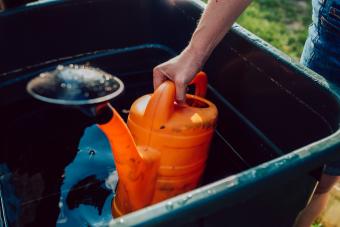
Is it illegal to collect rainwater in the United States? It used to be illegal for private citizens to harvest rainwater in some states, but within the past few decades, laws have changed as state governments have become more supportive of sustainable living practices. Now all states allow private stormwater collection, but some restrict it and others incentivize it.
Nevada and Colorado have the strictest regulations, but other states restrict rainwater harvesting as well. Find out if your state regulates rainwater collection and what you need to know before you set up that rain barrel.
Arkansas

Arkansas is one of many states where it's legal to harvest rainwater, but there are some state restrictions surrounding the process.
The 2014 Arkansas Code Annotated 17-38-201 outlines that rainwater can only be harvested for a non-potable (outdoor, non-ingestible way) so long as the system follows three requirements:
- Designed by an Arkansas-licensed professional engineer.
- Designed with cross-connection safeguards.
- Complies with the Arkansas Plumbing Code.
California

With the massive wildfires in our recent past, you can't deny that California is one drought-ridden state where every ounce of rainwater is vital. So, you'd think they'd have rainwater harvesting completely banned, right? Wrong.
In 2012, the state passed Assembly Bill 1750, which allowed the Rainwater Capture Act of 2012. Basically, it made collecting rainwater legal so long as you follow the California State Water Resource Board's requirements.
The bill outlines that certified landscape contractors can install water collection systems "used exclusively for landscape irrigation or as a water supply for a fountain, pond, or similar decorative feature in a landscaping project." Similarly, the bill struck down landowners needing to have water right permits to collect rainwater from rooftops.
In some counties, there may even be incentives for rainwater harvesting. Check with your county for more information.
Colorado

Historically, Colorado has some of the strictest laws against rainwater collection. This stems from the state catering to senior water rights per the Prior Appropriation System. To simplify things, it basically means that the first person to take some water and use it for a beneficial reason has the first right to claim exclusive use of it.
This complicated system of "I touched it so it's mine" kind of appropriation can make legalizing rainwater collection a nightmare. Yet, in 2009, the state government decriminalized rainwater collection for non-potable purposes.
This got outlined further in the 2016 House Bill 16-1005, which specifies that people can have up to two rain barrels that don't collectively hold over 110 gallons.
Georgia

Rainwater harvesting in Georgia isn't illegal per se, but they do have state-sponsored regulations and incentives to encourage people to have water-efficient rainwater collection systems. According to the 2017 Georgia Code 48-7-40.29, you can get a tax credit for buying an EPA-approved system in that taxable year. Specifically, the credit should amount to 25% of the equipment's cost or $2,500 (whichever is less).
As to what you're allowed to collect rainwater for, rainwater can be harvested for non potable reasons (such as gardening), but their plumbing codes don't permit you to use it for potable reasons. In other words, you can't transform rainwater into drinking or cooking water.
Illinois

Illinois isn't a particularly dry state, so it makes sense that they'd permit rainwater harvesting - but with some qualifications. The 2012 Public Act 97-1130 explains that rainwater systems are allowed for non-potable uses, so long as they follow the Illinois Plumbing Code. You also can't collect more than 5,000 gallons.
And if you're moving to a new neighborhood, under 2011 House Bill 991, HOA's only have 120 days to outline where rainwater collection systems are permitted in their neighborhoods.
Nevada

Nevada is right up there with Colorado in how complex their rainwater collection laws are. Since 2017, rainwater harvesting has been legal with some restrictions.
The Nonpotable Rainwater Collection and Distribution System outlines what you're allowed to do:
- You can only collect water from a single-family home's rooftop.
- Everything collected has to be used for non-potable domestic use.
- You cannot conflict with existing water rights in your area.
- You can't have storage systems of over 20,000 gallons.
- The capture area you're pulling from can't exceed an acre.
North Carolina

In North Carolina, rainwater collection isn't expressly prohibited. The Department of Environment and Natural Resources handles everything concerning it. The biggest development came in 2009 when House Bill 749 passed.
Specifically, the bill authorizes people and businesses to use "cisterns to provide water for flushing toilets and for outdoor irrigation in the construction or renovation of residential or commercial buildings or structures." It also prohibits any government at any level (local, county, state) from banning cistern use for those purposes.
As outlined in the bill, cisterns mean "a storage tank that is watertight; has smooth interior surfaces and enclosed lids; is fabricated from nonreactive materials, is designed to collect rainfall from a catchment area." They don't regulate the size of cistern you can use or whether you can have it inside or outside.
Ohio

Ohio does things a bit differently than the rest of the U.S. Not only do they allow rainwater collection but they also let you drink it. However, their only restrictions on rainwater collection surround this potable usage. According to the Ohio Revised Code 3701.344, if you plan on using your collected rainwater for drinking (for 25 people or less), then your system has to be regulated by the Ohio Department of Health.
Oregon

Rainwater collecting in Oregon is legal, but you can only set up a catchment system on rooftop surfaces. The harvested water also shouldn't be used in potable ways. This is Oregon's workaround for their prior appropriation laws on the books that designate most surface water to old permit holders. So, anything collected on a rooftop doesn't require a permit.
And if you live in Portland, you might want to think about setting up a collection system because they offer incentives, like the Clean River Rewards.
Rhode Island

It's completely legal to collect rainwater in Rhode Island, and there are some impressive tax credits offered if you install a cistern to collect rainwater. Check out the 2012 House Bill 7070 for more details on that.
But, to follow Rhode Island's plumbing code, you should only set up approved-cisterns that collect water from impervious roof surfaces.
Texas

Texas' House Bill 3391 outlines their particular requirements for harvesting rainwater in the Lone State. Given that ranching is such a big part of their infrastructure and they stte is drought prone, rainwater collection is taken very seriously in Texas.
According to the bill, your catchment systems have to be incorporated into the building designs (no lone cisterns littering the side of your house), and you have to send a written notice to the municipality or owner of the water supply system you use. And if you're using your collected water for potable purposes, you have to properly treat it.
Check out Texas' state guidelines for more details about setting up your system.
Utah

Utah's restrictions on rainwater harvesting aren't particularly difficult to follow. If you want to store more than 2,500 gallons of rainwater, you need to be registered with the Division of Water Resources as outlined in the 2010 Senate Bill 32. If you don't want to register, you can only have up to two 100-gallon containers.
Sign up for our newsletter featuring all the latest stories and products we love.
Vermont

It's legal to harvest rainwater in Vermont, although there are some restrictions on how you are able to use the water.
You can't collect the water to drink unless it's treated, and you also can't collect rainwater from roofs that contain contaminants like lead.
Virginia

Rainwater collection for non-potable and outdoor use is legal in Virginia and even incentivized. But, there are restrictions you need to follow outlined in the Virginia Code 32.1-248.2. However, depending on the county you live in, there may be extra things you need to follow, so contact your local water commission for more information.
Washington

In Washington, you can collect rainwater without a permit so long as you collect it from a rooftop and it's being used on the property where it's collected as outlined in the Washington Rev. Code 36.89.080. Given that parts of Washington are incredibly wet, these efforts can help reduce the amount of storm drain overflow that happens with heavy rainfall. The state even has incentives in place for rainwater harvesting.
States Without Rainwater Harvesting Regulations

If you live in the following states, you can harvest rainwater to your heart's content with no statewide restrictions. Some local governments (city and county) may have restrictions, so it's always best to check your local laws as well.
- Alabama
- Alaska
- Arizona
- Connecticut
- Delaware
- Florida
- Hawaii
- Idaho
- Indiana
- Iowa
- Kansas
- Kentucky
- Louisiana
- Maine
- Maryland
- Massachusetts
- Michigan
- Minnesota (not at state level; check local regulations)
- Mississippi
- Missouri
- Montana
- Nebraska
- New Hampshire
- New Jersey
- New Mexico
- New York
- North Dakota
- Oklahoma
- Pennsylvania
- Rhode Island
- South Carolina
- South Dakota
- Tennessee
- West Virginia
- Wisconsin
- Wyoming
Rainwater Collection Is Restricted in Some States

As sustainability practices become more ingrained, state governments are catching up with fewer regulations on private stormwater collection. So while your state may have restrictions, harvesting rainwater is allowed in all 50 states. It's a perfect way to gather water for your garden during dry spells.







